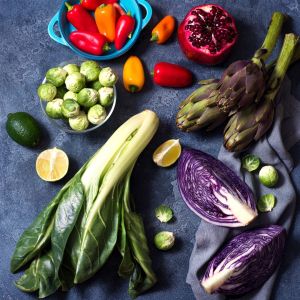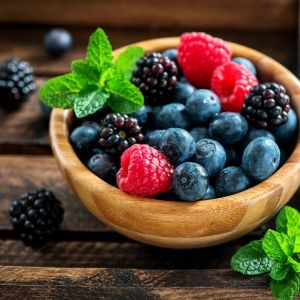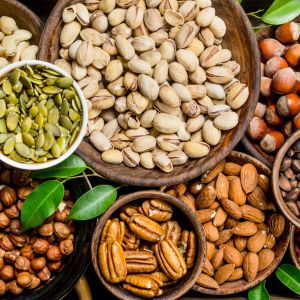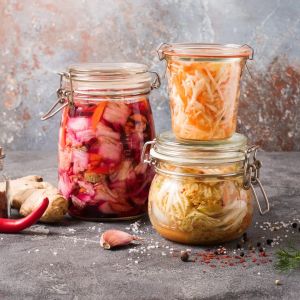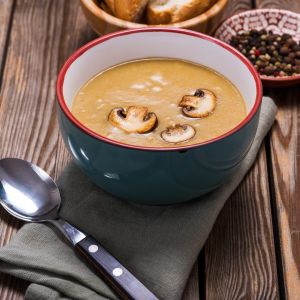🌿 Anti-Aging Foods for Healthy Skin and Longevity: A Plant-Based Approach That Works
Looking for a natural way to boost skin health and slow visible signs of ageing? The answer may be on your plate. An anti-aging diet rich in whole, plant-based foods can help reduce wrinkles, boost collagen, and support vibrant, resilient skin from the inside out.
🔬 What Drives Skin Aging?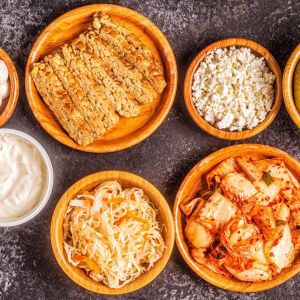
Skin aging is influenced by both internal and external factors. The most common contributors include:
- Oxidative stress: Caused by free radicals that damage skin cells and collagen.
- Chronic inflammation (inflammaging): Persistent low-grade inflammation that breaks down skin structure.
- Glycation (AGEs): Sugar binds to collagen and elastin, leading to stiffness and wrinkle formation.
- Gut-skin axis disruption: Poor gut health can trigger inflammation and impair nutrient absorption.
- Impaired skin barrier: A weakened barrier allows water loss and irritant penetration.
- Reduced Nrf2 activity: Nrf2 is a protective cellular pathway that declines with age, reducing antioxidant defences.
🥗 The Foundations of an Anti-Aging Diet
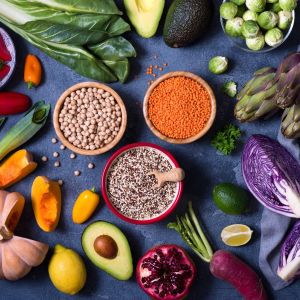 Based on principles promoted by Dr. Michael Greger and the latest nutritional science:
Based on principles promoted by Dr. Michael Greger and the latest nutritional science:
- Eat a high-fibre, plant-based diet. Think Mediterranean—but with more legumes, seeds, and whole grains.
- Prioritise polyphenol-rich and cruciferous vegetables. These fight inflammation and activate your body’s internal detox systems.
- Focus on healthy fats. Choose plant-based omega-3s (like flax, chia, and walnuts).
- Include diverse plant-based protein. Vital for collagen synthesis and tissue repair.
- Limit ultra-processed foods, added sugars, and high-heat animal products. These accelerate aging through inflammation and glycation.
❌ Top Foods to Avoid for Skin Aging
- Bacon, BBQ, deep-fried meats: High in AGEs, collagen-damaging compounds.
- Refined carbs & sugar: Spikes insulin, increases glycation and wrinkles.
- Unfermented dairy: May elevate IGF-1 and cause inflammation in sensitive individuals.
- Trans fats & processed foods: Linked to oxidative damage and barrier dysfunction.
- Excess red meat: Increases inflammation and oxidative stress.
✅ Best Anti-Aging Foods for Skin Longevity
🌾 Vegetables – eat a wide variety of colours and types of vegetables – aiming for minimum of 600 grams each day.
- Leafy greens (spinach, kale): Rich in carotenoids, ALA, and vitamin C.
- Cruciferous veg (broccoli, cabbage): Activate Nrf2 and support detoxification.
- Alliums (onions, garlic): Anti-inflammatory and sulfur-rich.
- Beetroot: Boosts nitric oxide, improves circulation.
- Orange/red veg (carrots, pumpkin, capsicum): Provide beta-carotene, lutein, and UV protection.
🍇 Fruits
- Berries: High in anthocyanins, antioxidants, and vitamin C.
- Citrus fruits: Great for collagen synthesis.
- Tomatoes: Lycopene protects against sun damage.
- Avocados: Contain healthy fats, lutein, and vitamin E.
🧃 Whole Grains, Legumes & Beans
- Chickpeas, lentils, soybeans: Rich in protein, fibre, and isoflavones for collagen support.
- Quinoa & buckwheat: Complete proteins with B vitamins.
🥜 Nuts & Seeds
- Walnuts: ALA, selenium, and antioxidants.
- Flax & chia: Omega-3s, lignans, and gut-supportive fibre.
- Almonds: High in vitamin E.
- Pumpkin seeds: Packed with zinc, magnesium, and selenium.
🌿 Herbs & Spices
- Turmeric (curcumin): Reduces inflammation, activates Nrf2.
- Cinnamon & oregano: Antioxidant-rich, blood sugar-balancing.
- Ginger & cumin: Anti-inflammatory and digestion-supportive.
🧬 Fermented Foods
- Kimchi, sauerkraut, miso, tempeh: Enhance gut-skin axis and reduce inflammation.
- Lactobacillus plantarum: Clinically shown to reduce collagen breakdown and improve hydration.
🍫 Dark Chocolate (70%+)
- Contains flavanols that improve circulation, skin hydration, and UV resistance.
☕️ Antioxidant Drinks
- Green tea (EGCG): Reduces inflammation and protects DNA.
- Hibiscus & chamomile: Calming and antioxidant-rich.
- Coffee (moderate): Provides chlorogenic acid for antioxidant support.
🌳 Mushrooms & Seaweed
- Mushrooms: Contain ergothioneine, a skin-protective antioxidant.
- Seaweed: Rich in minerals, polyphenols, and marine-source omega-3s.
🧬 Functional Nutrients That Preserve Collagen
To prevent collagen breakdown:
-
- Omega-3s (ALA, EPA/DHA): Suppress collagenase enzymes.
- Vitamin C: Essential for collagen formation.
- Polyphenols: From berries, cocoa, and green tea.
- Sulfur compounds: From alliums and crucifers.
- Probiotics (L. plantarum): May reduce MMP activity and improve hydration.
- Omega-3s (ALA, EPA/DHA): Suppress collagenase enzymes.
🧪 Final Thoughts: Let Food Be Your Skin’s Investment
Eating for skin health isn’t about short-term beauty trends—it’s about long-term resilience, collagen support, and reducing inflammation at the cellular level.
By choosing whole, plant-based, anti-inflammatory foods, you can help your skin age more gracefully, naturally, and healthfully.
Want more personalised advice? Book a skin longevity consultation with our team at Pearl Medispa today.
#SkinLongevity #AntiAgingDiet #PlantBasedSkinCare #SkinHealthFromWithin #PearlMedispa

